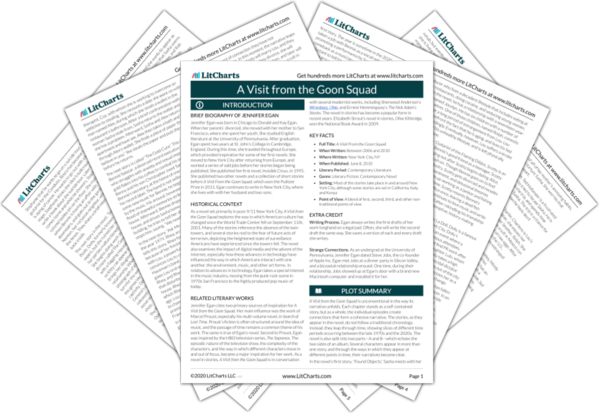The sun is a constant symbol throughout the novel, and serves to point the reader toward the passage of time, and also the theme of ruin and redemption. The presence of the sun is linked to both the destructive force of time on the lives of the characters, and also moments where time has landed them in situations that are stable and joyous. For example, in the story, “Ask Me If I Care,” Scotty stares at the sun with such intensity that it damages his eyes. This harmful act is associated with the death of his mother, which points toward the idea of time and ruin. More often than not, however, the sun symbolizes both ruin and redemption at once. While visiting Lou, Jocelyn fondly remembers watching the sunrise with Lou’s son, Rolph, comparing it to a baby, and imagining they could hold it in their arms. In this moment, the sun stands as an image of hope, but this hope is also backdropped by the knowledge that Rolph has gone on to commit suicide. The same is true of the sunrise in the story, “Out of Body.” The sunrise marks the day of Rob’s drowning, but also suggests hope for Sasha as she transitions toward a better life. Though the sun, as a symbol, has several shades of meaning through out the novel, it undoubtedly alludes to the passage of time, and serves to illuminate the experience of loss and hope the characters endure, often in the same instant.
The Sun Quotes in A Visit from the Goon Squad
She could tell that [Alex] was in excellent shape, not from going to the gym but from being young enough that his body was still imprinted with whatever sports he'd played in high school and college. Sasha, who was thirty-five, had passed that point. Still, not even Coz knew her real age. The closest anyone had come to guessing it was thirty-one, and most put her in her twenties. She worked out daily and avoided the sun. Her online profiles all listed her as twenty-eight.
"Women are cunts," his father says. "That's why.”
…
"They are not—" He can't make himself repeat the word.
"They are," Lou says tightly. "Pretty soon you'll know it for sure."
Rolph turns away from his father. There is nowhere to go, so he jumps into the sea and begins slowly paddling back toward shore. The sun is low, the water choppy and full of shadows. Rolph imagines sharks just under his feet, but he doesn't turn or look back.
On another day more than twenty years after this one, after Sasha had gone to college and settled in New York; after she'd reconnected on Facebook with her college boyfriend and married late (when Beth had nearly given up hope) and had two children, one of whom was slightly autistic…Ted, long divorced—a grandfather—would visit Sasha at home in the California desert…And for an instant he would remember Naples: sitting with Sasha in her tiny room; the jolt of surprise and delight he'd felt when the sun finally dropped into the center of her window and was captured inside her circle of wire.
Now he turned to her, grinning. Her hair and face were aflame with orange light.
"See," Sasha muttered, eyeing the sun. "It's mine."












